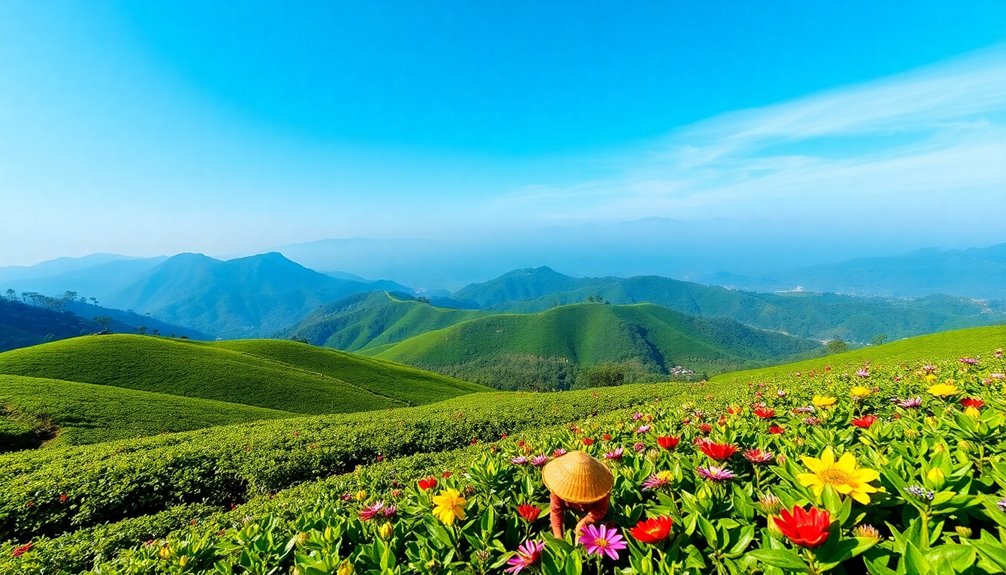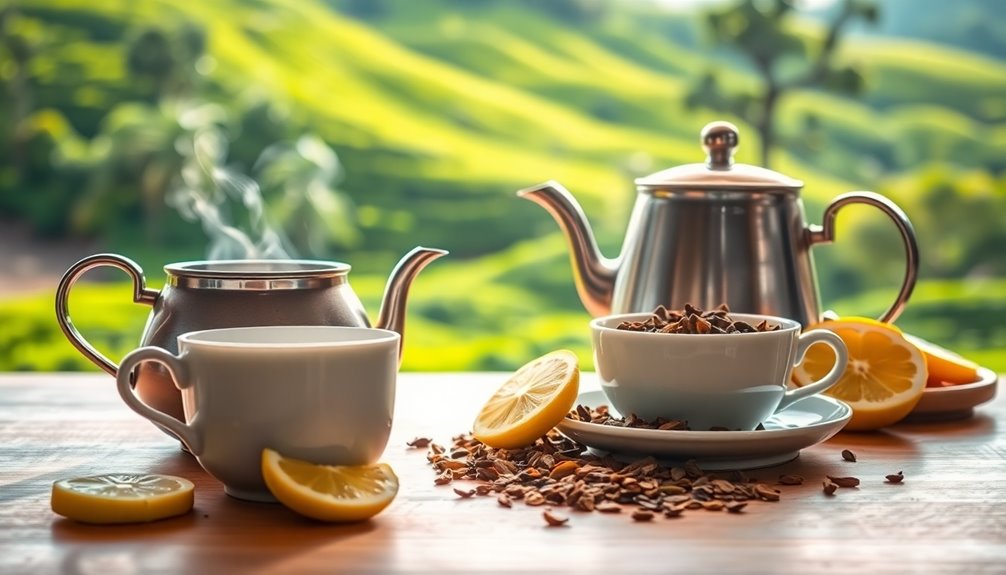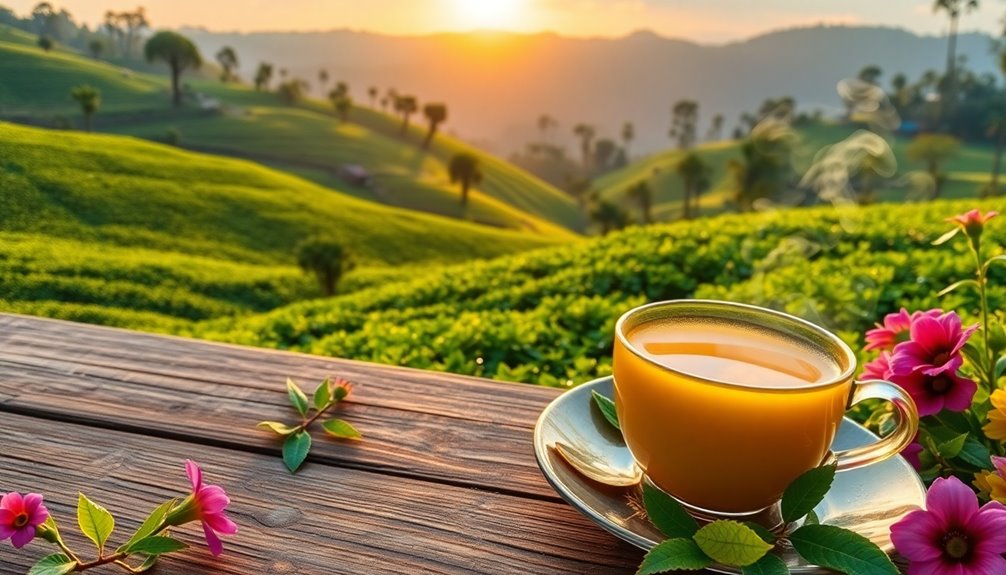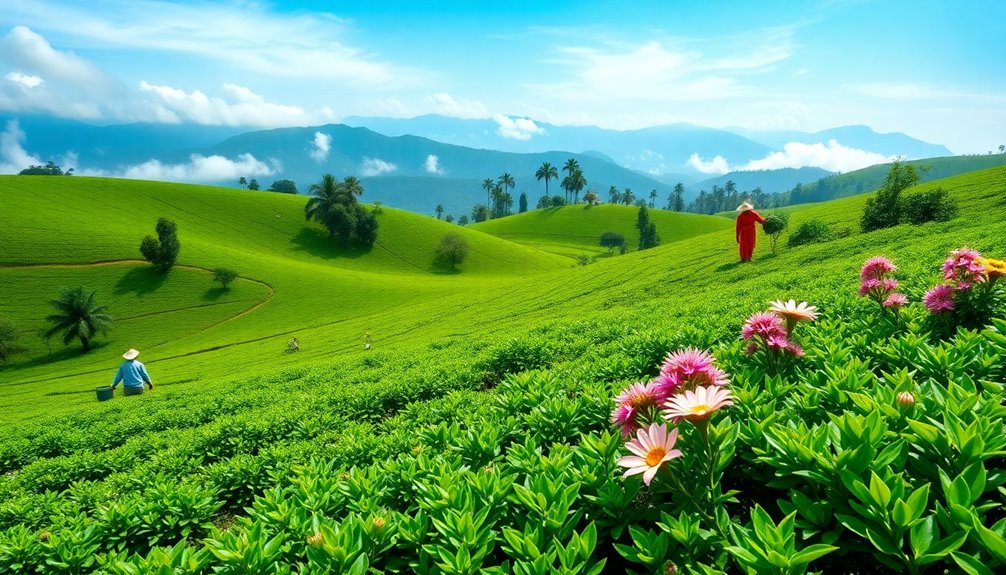Get ready for an adventure in the beautiful tea estates of Sri Lanka! You'll stroll through lush green hills, meet friendly local workers, and sip on delicious Ceylon tea. Here's what to enjoy:
- Visit Nuwara Eliya, known for stunning tea plantations.
- Learn about tea production and the rich culture behind it.
- Discover different tea types, like black and green, bursting with flavor!
You and your family will make wonderful memories in this vibrant landscape. Excitement awaits you around every corner, so stick around — there's so much more to explore in this tea-loving paradise!
Key Takeaways
- Discover stunning landscapes and lush greenery of Nuwara Eliya, known for its picturesque tea plantations and rich heritage.
- Engage with local workers through guided tours to learn about the tea production process and its cultural significance.
- Experience the unique flavors of high-quality Ceylon teas, including black, green, and white, produced in different growing regions.
- Explore the economic impact of tea tourism, which supports local communities and enhances rural development in Sri Lanka.
- Understand the labor rights challenges faced by Tamil estate workers, highlighting the importance of ethical tourism practices in tea estates.
Introduction
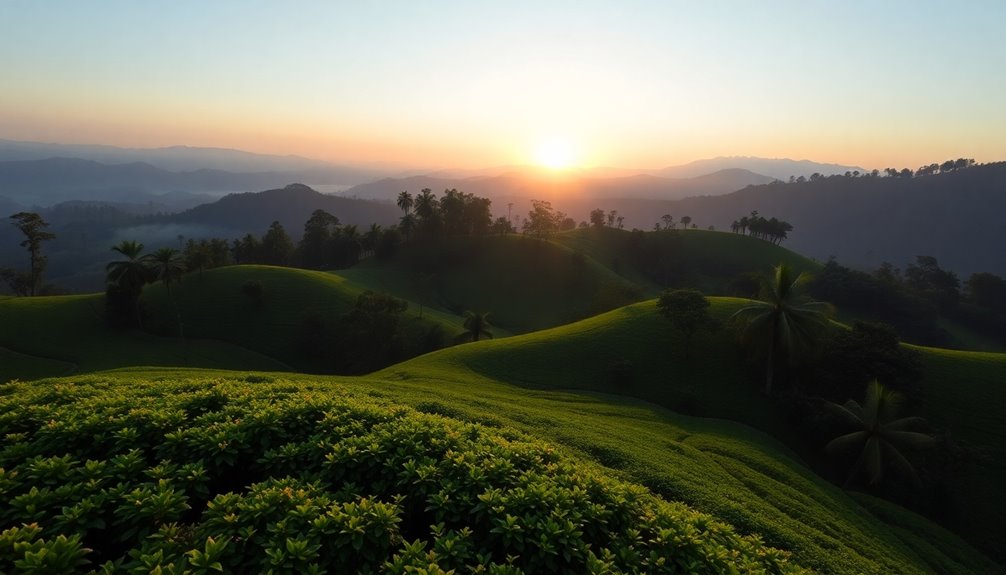
Tea culture in Sri Lanka is a vibrant tapestry woven into the nation's identity. When you visit, you'll find stunning tea plantations nestled in the lush hills, especially in beautiful places like Nuwara Eliya. This region is famous for its rich heritage of tea cultivation, which began in the mid-19th century. Sri Lanka is now known for its high-quality tea, including black, green, and white varieties.
Imagine walking through the scenic beauty of the tea estates, breathing in the fresh mountain air. You can take guided tours that let you meet local workers and learn about their daily lives. These cultural experiences will help you appreciate the hard work that goes into producing the delicious tea you love.
As you sip on a warm cup of Sri Lankan tea, you'll taste the unique flavors that come from the ideal growing conditions. The high altitudes and nutrient-rich soil create a perfect environment for tea plants to thrive.
Tea's Role in Sri Lankan Economy
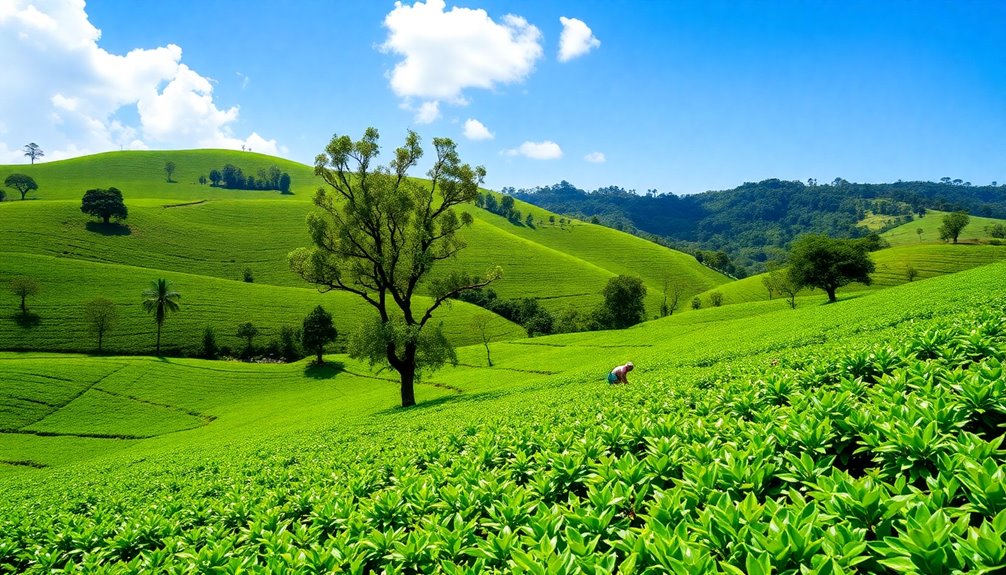
One of the most significant contributors to Sri Lanka's economy is the tea industry, which plays a vital role in the nation's financial landscape. This industry isn't just about sipping a warm cup of Ceylon tea; it's about the lives it touches!
Sri Lanka produces around 300 million kilograms of tea each year, making it the fourth-largest tea producer in the world.
- Employment: Over a million people work in tea production in Sri Lanka, providing jobs to many in rural communities.
- Export Revenue: The tea industry contributes around 2% to the country's GDP, generating important export revenue.
- Economic Growth: The rising global demand for high-quality Sri Lankan tea helps stimulate economic growth in the central highlands.
But that's not all! Tea tourism is blooming too.
Visitors love taking guided tours of the lush tea estates, enjoying tastings, and learning about tea culture. This not only brings joy to tourists but also boosts local economies.
Economic Impact of Tea Exports
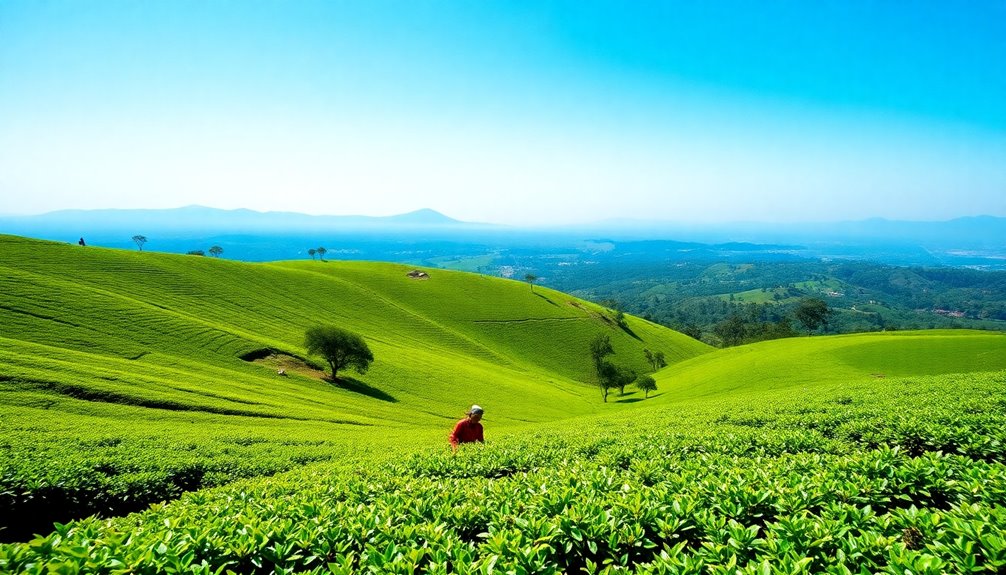
The economic impact of tea exports on Sri Lanka is profound and far-reaching. Did you know that tea production in Sri Lanka makes the country the fourth-largest tea producer in the world?
Tea exports account for about 15% of Sri Lanka's total export earnings, which is a huge deal! In 2020, Sri Lanka exported around 230 million kilograms of tea, bringing in approximately $1.25 billion.
Ceylon tea is loved worldwide, especially in places like the Middle East, Europe, and North America. This growing demand not only boosts the tea industry but also creates rural employment for over a million people.
When tea estates thrive, local economies benefit too.
Here are a few key points about the economic impact of tea exports:
- Supports ancillary industries like packaging and transportation
- Enhances sustainable development in rural areas
- Stimulates local economies through job creation
Heritage of Ceylon Tea
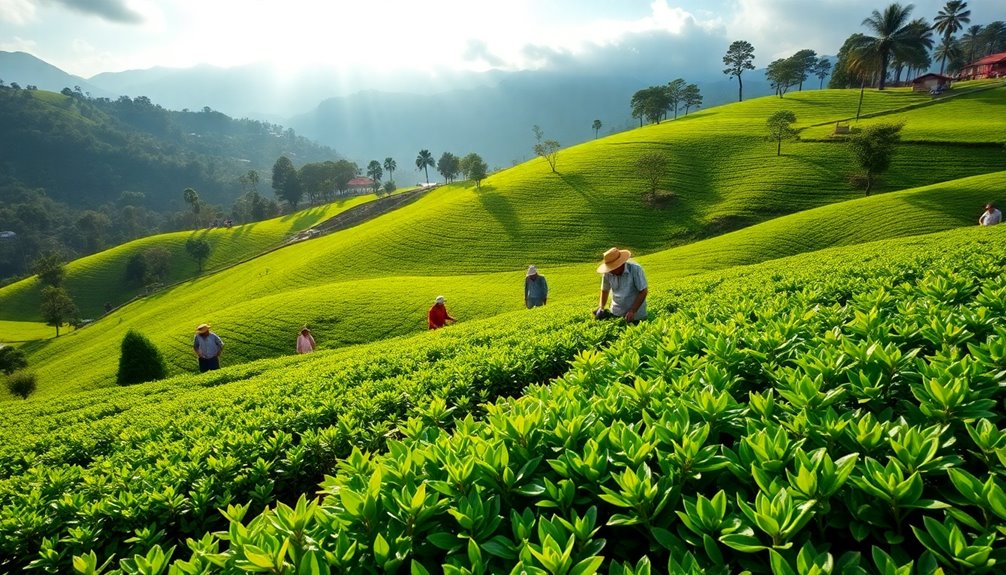
Ceylon Tea embodies a rich heritage that intertwines with Sri Lanka's identity and culture. Did you know that tea production in Sri Lanka began in the mid-19th century? It was James Taylor who planted the first commercial tea estate in 1867, changing the country's economy forever!
The central highlands, especially Nuwara Eliya, create the perfect climate for growing tea, which is why many call it the Champagne of Ceylon.
What makes Ceylon Tea so special? It's all about the unique flavor! Different regions, like high-grown, mid-grown, and low-grown areas, each contribute their own taste. This diversity helps create a variety of delightful teas.
Plus, the tea industry plays a big role in rural development, employing over a million people and helping to preserve Sri Lanka's rich cultural heritage.
When you sip on a cup of Ceylon Tea, you're not just enjoying a drink; you're experiencing a piece of history! So, next time you enjoy this tea, remember the beautiful tea estates and the hardworking people behind it. It's a celebration of culture, flavor, and community in every sip!
Labor Rights Issues in Plantations
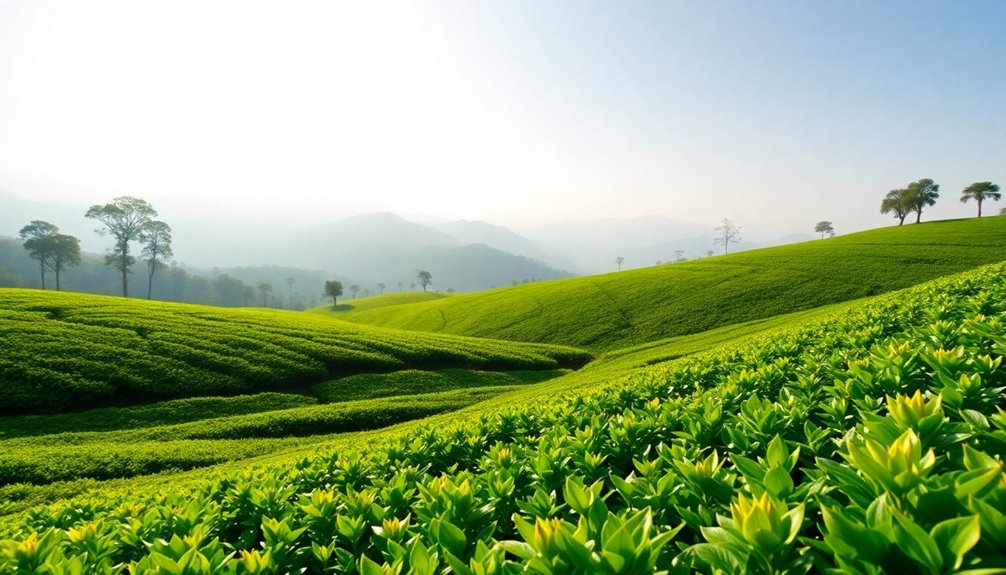
While tea plantations in Sri Lanka are renowned for their lush landscapes and rich flavors, they often hide a troubling reality for the workers who maintain them. Tamil estate workers play a crucial role in producing your favorite tea, but they face serious labor rights issues. Many earn low wages, sometimes as little as 800 to 1,000 Sri Lankan Rupees a day, which is below the national minimum wage. This can make life tough!
Their living conditions aren't much better. Workers often live in line rooms—small and overcrowded spaces that lack clean water and proper sanitation. Unfortunately, discrimination remains a problem due to a long-standing caste system, making it hard for some workers to find fair treatment or advancement opportunities.
Thankfully, there are labor unions and NGOs working hard for advocacy. They strive to improve labor rights, ensuring better wages and living conditions for these dedicated workers.
However, the power dynamics between plantation owners and workers create challenges. It's important to be aware of these issues so that we can appreciate the tea we enjoy even more, knowing the stories behind it!
Practical Applications
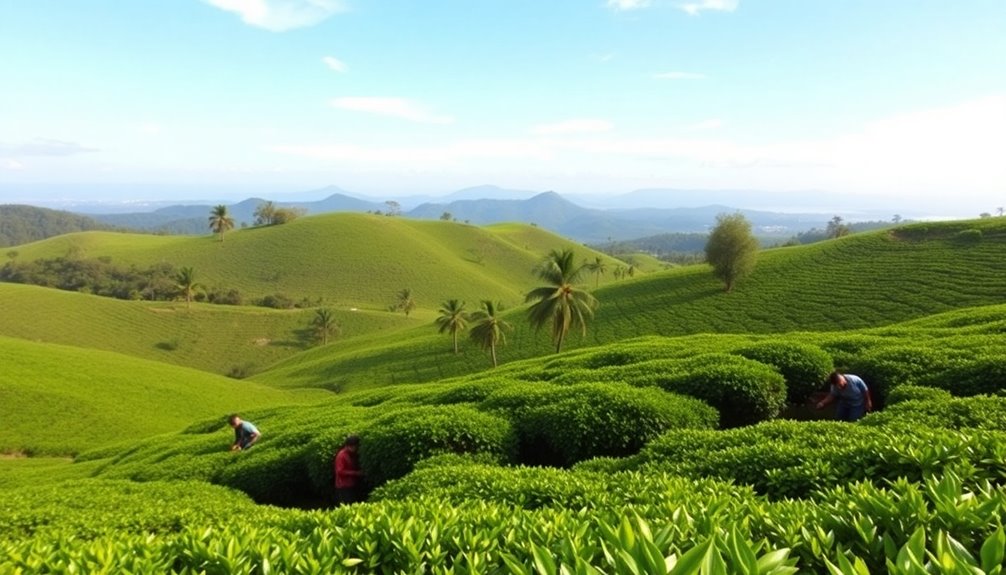
Exploring Sri Lanka's tea estates offers you a unique blend of adventure and cultural immersion. You can plan your visit between December and April when the weather is sunny and perfect for hiking and trekking.
- Guided Tours: Take a guided tour at famous tea plantations like Mackwoods Labookellie. You'll learn about the tea-making process and get to taste delicious local tea!
- Tea Leaf Picking: Don't miss the chance to try tea leaf picking in areas like Ella. It's a fun way to understand local tea cultivation.
- Colonial-Era Bungalows: Stay in charming colonial-era bungalows or eco-lodges, surrounded by the beauty of the tea fields.
- Tea Culture: Participate in traditional tea ceremonies during your visits. This experience will deepen your appreciation for Sri Lankan tea culture and its fascinating history.
Frequently Asked Questions
Where Is the Best Place to Visit Tea Plantations in Sri Lanka?
You'll find the best tea plantations in Nuwara Eliya for its cool climate and stunning views. Kandy's rich history and Ella's scenic beauty also offer unique experiences, while Dimbula boasts flavorful black tea for tastings.
Is It Worth Visiting a Tea Plantation in Sri Lanka?
Absolutely, it's worth visiting a tea plantation in Sri Lanka! You'll enjoy stunning landscapes, learn about the tea-making process, and connect with local communities while savoring exquisite Ceylon teas. It's a unique and enriching experience.
What Is the Most Famous Tea in Sri Lanka?
The most famous tea in Sri Lanka is Ceylon tea. It's celebrated for its high quality and distinct flavors, especially Ceylon black tea, which offers a bright color and full-bodied taste that tea lovers adore.
Which Is the Highest Tea Estate in the World?
The highest tea estate in the world is the Pedro Tea Estate, located in Nuwara Eliya, Sri Lanka. At 1,400 meters above sea level, it offers breathtaking views and unique, flavorful Ceylon tea.
Conclusion
Visiting the tea estates of Sri Lanka is an adventure you won't want to miss! You'll see lush green hills, learn about tea's rich history, and taste some of the best tea in the world. Plus, you'll discover how important tea is to the country's economy and the lives of the workers. So pack your bags, gather your family, and get ready for a fun trip filled with beautiful sights and delicious sips!

